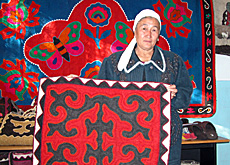Swiss welcome action plan for Central Asia

The Swiss president, Joseph Deiss, has welcomed a plan by the European Bank for Reconstruction and Development (EBRD) to boost the economies of Central Asia.
Addressing the EBRD’s annual meeting in London on Monday, Deiss said the region was poorer than it had been at any time during the Soviet era.
The EBRD’s plan aims to help those countries which remain in the early stages of transition from a centralised to a free-market economy.
Some of the poorest countries in Central Asia and the Caucasus – including Armenia, Azerbaijan, Kyrgyzstan, Tajikistan and Uzbekistan – are being targeted.
Deiss, who as economics minister also acts as the Swiss governor at the EBRD, told delegates that investment programmes in central European countries had paid off.
But he added that the bank’s projects in Central Asian countries had so far failed to promote sustained economic reform.
Soviet legacy
Many former Soviet-bloc nations have struggled to find their feet since the collapse of Communism in 1991 and the end of an 80-year-long economic lifeline from Moscow.
“After 13 years of independence, the average quality of life per inhabitant there is still below Soviet-era levels,” Deiss said.
Those in charge of development projects warn that authoritarian regimes continue to stifle growth and that widespread corruption in countries such as Azerbaijan is hindering economic progress.
The EBRD’s plan will focus on the promotion of local small- and medium-sized enterprises (SMEs) and the encouragement of more foreign investment in the region.
Action plan
“We must adapt our financial know-how to ensure that we meet the needs of SMEs, which form the backbone of these economies,” Deiss said.
He suggested the bank could help by simplifying its procedures and cutting transaction costs.
Deiss also called on the EBRD to focus on poverty reduction programmes that the countries concerned can develop on their own.
“It is important that bankers are convinced that the most stimulating challenges are in countries in the early stages of transition [towards a market economy],” Deiss added.
Swiss involvement
Switzerland has been actively involved in providing development aid to Central Asia for over a decade.
It represents several Central Asian countries at the International Monetary Fund (IMF) and the World Bank.
The State Secretariat for Economic Affairs (Seco) and the Swiss Agency for Development and Cooperation (SDC) have provided funding for a number of schemes aimed at helping the countries to develop their economies.
The projects are designed to promote good governance, conflict prevention, the creation of efficient health systems and the protection of natural resources.
swissinfo, Joanne Shields
The European Bank for Reconstruction and Development (EBRD) was formed in 1991, following the collapse of the Soviet Union.
It was created to help ex-Soviet countries develop a free-market economy.
The bank currently invests in 27 countries in central Europe and Central Asia.
The EBRD consists of 60 member countries and two non-governmental organisations.

In compliance with the JTI standards
More: SWI swissinfo.ch certified by the Journalism Trust Initiative










You can find an overview of ongoing debates with our journalists here . Please join us!
If you want to start a conversation about a topic raised in this article or want to report factual errors, email us at english@swissinfo.ch.